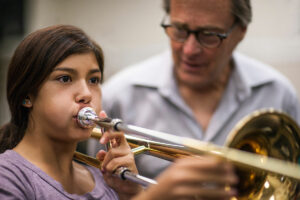Your grandchild has come to live with you, and it feels like everyone is finally settled into the new routine at home. You find that you have the time, energy, and interest to get involved at your relative child’s school. However, you need help figuring out where to start beyond the meetings about IEPs, 504s, or behavior plans.
Being active in your grandchild’s school experience can be a fun, fulfilling way to create further connections with them. Your presence in their school life can help them feel safe and understand that you are “all in” to help them thrive.
Look for Opportunities to Volunteer.
Most schools offer opportunities for parents and caregivers to get involved. In fact, many schools are desperate for volunteers to help them maintain the events and activities that make their school community engaging for the students and teachers.
Some typical volunteer opportunities include:
 Chaperones for field trips, band competitions, school dances, and other off-campus activities
Chaperones for field trips, band competitions, school dances, and other off-campus activities- Classroom support for class parties, science fairs, and other big projects or activities
- Chairing school events or fundraisers for the parent-teacher association
- Creating, printing, copying, translating, or organizing newsletters and announcements
- Recruiting for school-related events through phone calls or emails
- Library help to shelve books or check in returned books
Attend Events The School Offers
Your Presence Matters to This Child
It might feel like a lot to add to your family calendar. However, attending school-related activities together sends a positive message to this child. You are saying that they matter and that you value the work they do in the classroom. Your participation tells your grandchild that you care about what they are doing.
So, go to their band concerts, attend their plays, and join the fun at family movie nights. If your family loves soccer, attend the games together (even if your student doesn’t play) and support their peers. When your grandchild knows you are interested in what interests them, you gain an open door to their hearts and minds.
Your Presence Matters to the School
You can also tell teachers and administrators you are present and invested in this child’s educational experience. Your presence helps schools cultivate an environment of care, purpose, and success. Most schools offer activities to promote parent and caregiver engagement and understanding.
- “Back to School” or “Meet the Teacher” nights
- Parent-teacher conferences
- Informational sessions about new or changing curriculum
- Course selection planning for the next year
- Information sessions on the college application process, financial aid, or transitioning to the workplace
Being less involved is tempting as students enter junior high and high school. However, as this child navigates toward adulthood, your continued presence is crucial to help them feel supported for success.
Prioritize a Mindset of Learning
When your grandchild or loved one is home, emphasize the value of learning by discussing what they did in school that day. You can try conversation starters at the dinner table, such as “Tell us one new thing you learned today.” When you keep track of what classes they are taking and what units they are studying, you can be more specific with your conversation starters!
There are many other creative ways to create a culture of learning in your home while this child lives with you:
- Read together (or read to them if they cannot read yet)
- Let them see you reading for your own pleasure
- Find podcasts to enjoy together
- Talk about what you are learning
- Ask questions about their school work, projects, or assemblies
- Prioritize homework time by creating routines and a space for schoolwork
- Watch educational shows together on topics that interest you both
Be Part of a Cycle of Success
Staying involved with your grandchild’s school experience takes extra time and intention. It is worth the investment because it helps you build relationships with your loved one’s child, the teachers, and other educational professionals who support this child.
Healthy school communities depend on the involvement of parents, caregivers, and other community members to meet the children’s needs. Thriving schools create vibrant communities. Robust communities sustain healthy school environments. That cycle of success is beneficial for all of you!
